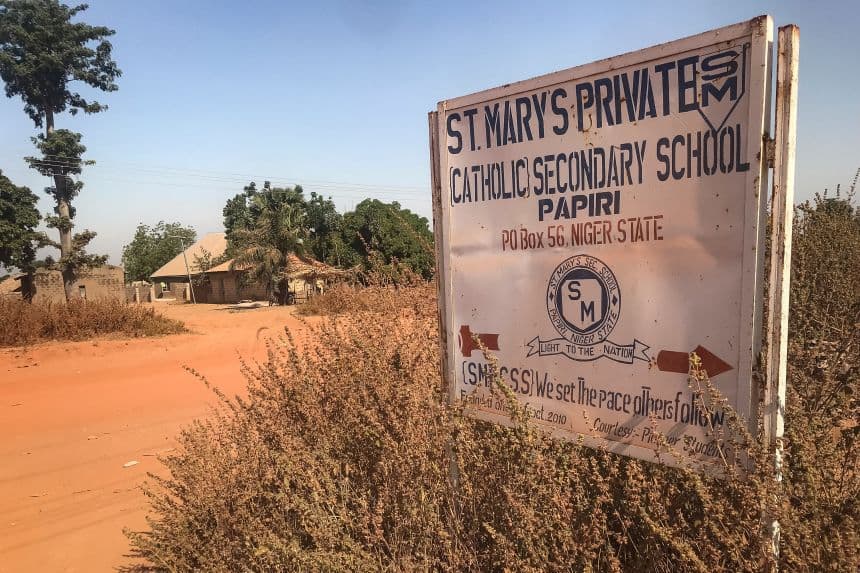We're loading the full news article for you. This includes the article content, images, author information, and related articles.
The mass abduction highlights a deepening security crisis in West Africa, raising concerns over regional stability and the growing audacity of armed groups—a trend with potential implications for security across the continent, including East Africa.

ABUJA, NIGERIA – A frantic search operation is underway in Nigeria's north-central Niger State after gunmen abducted 303 students and 12 teachers from a Catholic boarding school, in one of the largest mass kidnappings in the nation's history. While authorities confirmed on Sunday, November 23, 2025, that 50 of the students had managed to escape, the fate of the remaining 253 children and their teachers remains unknown, deepening a national crisis over school safety.
The attack occurred in the early hours of Friday, November 21, 2025, between 1:00 AM and 3:00 AM local time (3:00 AM and 5:00 AM EAT), when armed assailants stormed St. Mary's Catholic Primary and Secondary School in the remote Papiri community. The Christian Association of Nigeria (CAN) released the updated figures following a verification exercise, stating the abducted students were both male and female, aged between 10 and 18.
No group has yet claimed responsibility for the abduction. The incident is the latest in a string of violent attacks on schools and communities in northwest and central Nigeria, a region plagued by armed gangs, often referred to as 'bandits', who engage in mass kidnappings for ransom. This attack came just four days after 25 schoolgirls were seized in the neighbouring state of Kebbi. In response to the escalating threat, authorities in Niger State and several surrounding states have ordered the immediate closure of all schools.
The brazen nature of the St. Mary's school attack has sent shockwaves across Nigeria and drawn international condemnation. UN Deputy Secretary-General Amina Mohammed, a former Nigerian minister, stated that schools should be "sanctuaries for education, not targets." UNICEF's Regional Director, Gilles Fagninou, described the abductions as a "brutal and grave violation of children's rights." Pope Leo XIV also appealed for the immediate and unconditional release of all hostages during a public address on Sunday.
Nigeria's President Bola Tinubu has vowed that his government will not relent until every hostage is freed, according to a statement released welcoming the escape of the 50 students. The Nigerian military and police have deployed tactical squads to comb the vast forests in the region in a large-scale rescue effort.
This incident evokes painful memories of the 2014 Chibok abduction, when Boko Haram militants kidnapped 276 schoolgirls, sparking the global #BringBackOurGirls campaign. While initially associated with jihadist groups like Boko Haram and its offshoot, the Islamic State West Africa Province (ISWAP), kidnapping for ransom has evolved into a major criminal enterprise carried out by numerous armed bandit groups. These groups are motivated more by financial gain than ideology, turning the country's northwest into an epicenter for abductions.
While geographically distant, the escalating insecurity in Nigeria carries significant implications for the wider African continent. Nigeria, as one of Africa's largest economies and a key regional power, plays a crucial role in the stability of Sub-Saharan Africa. The government's struggle to contain widespread banditry and terrorism could have spillover effects, potentially destabilizing neighboring countries and creating broader regional security challenges.
For Kenya and the East Africa region, which face their own security threats from groups like Al-Shabaab, the crisis in Nigeria serves as a stark warning. The tactics employed by Nigerian armed groups—targeting soft targets like schools for mass abduction to extract ransoms and exert political pressure—could be replicated elsewhere. Security analysts note that the failure to effectively counter these groups in Nigeria could embolden similar criminal or extremist organizations across Africa.
The economic impact is also a major concern. Persistent insecurity has been shown to deter foreign investment and disrupt critical supply chains, not just within Nigeria but across West Africa. This economic instability can have ripple effects that impact intra-African trade and development goals. The crisis underscores the urgent need for enhanced intelligence sharing and coordinated security strategies among African nations to combat the transnational nature of these evolving threats. As the search for the remaining 265 hostages continues, the world watches, hoping for their safe return and for a lasting solution to a crisis that threatens the future of Nigeria's children and the stability of a continent.
Keep the conversation in one place—threads here stay linked to the story and in the forums.
Sign in to start a discussion
Start a conversation about this story and keep it linked here.
Other hot threads
E-sports and Gaming Community in Kenya
Active 9 months ago
The Role of Technology in Modern Agriculture (AgriTech)
Active 9 months ago
Popular Recreational Activities Across Counties
Active 9 months ago
Investing in Youth Sports Development Programs
Active 9 months ago